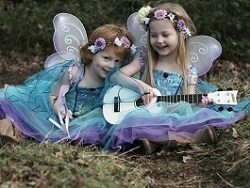Looking For The Real Father Christmas
“Imagination is more important than knowledge.” – Albert Einstein.
Inspecting a school on a dreary day at the end of November, I entered the Reception classroom and took the only adult chair available, which happened to be next to a little girl sitting on her own. She looked curiously at my white hair and beard, so, knowing they had all been told about inspectors being in school, I asked if she knew who I was. She puzzled for a moment and then very politely asked, ”Are you Father Christmas?”
 Is it good to believe?
Is it good to believe?
This Christmas many of our children will enjoy adventures in worlds inhabited by lions and fearsome witches, wizard academies and games on broomsticks, and will encounter an old man with a long white beard and a magic sack who drives flying reindeers. A scan of parenting websites reveals a vigorous debate about whether children should be encouraged to believe in Father Christmas and the various tales about him, or be told the truth about where their presents come from. Some parents want their children to experience the magic of believing for as long as possible while others are convinced that children should not be misled and should encounter the truth as soon as they are able to understand. What those opposing views highlight is the enormous differences in our understanding of the roles of imagination and fantasy in the lives of children and adults.
Three-year-olds will happily spend all day accompanied by tigers, princesses or superheroes. Older children can invent entire universes, complete with their own histories, using computers. Children’s brain development depends on such play and imaginative fantasy. In play, children gather information about the world, control the use of their bodies, learn social skills, develop language and encounter the information they need to fit the culture into which they were born. Research shows that playing is crucial to development at all ages. This is especially true of the sorts of play which are self-motivated, imaginative and independent; where children initiate their own games and invent their own rules, as my daughter once did when she decreed that, “Any many can play” in a game she had invented.
 Learning through play
Learning through play
Children love to imagine that they are somebody or something else. Whether it’s a princess, a fireman, a superhero or a teacher, they have incredible abilities to invent scenarios, and characters to populate those scenarios. It isn’t just the fantastic that stimulates children. Some of their earliest role-playing will be imitating parents doing everyday activities like cooking or gardening. It can be shocking to hear some of your choicest phrases coming from the mouth of your three year old!
Human brains are made for learning. Childhood is a time which researchers call “protected immaturity”, which gives the young time to learn the things they need to know in order to survive as adults. Humans have a longer childhood than any other species. Play for wolf cubs allows them to learn in a safe way about chasing and biting without the risks of real hunting. Like the cubs, human children also learn survival skills. But human children also learn in human ways. Humans, unlike other animals, can develop ideas about the world around them.
Creating ideas in play lets children understand the world and other people. However, an idea doesn’t just describe how the world is at the moment. Having ideas allows us to think about the ways the world might have been in the past or could be in the future. This is the special way in which humans are able to imagine and create new things. It is useful to remind ourselves that the things which surround us, our coffee cups, our computers, the cars we drive, the fabrics we wear and even our kitchen taps were once as fantastic as anything described in the tales of Narnia, Harry Potter or Doctor Who.
Imagination vs reality
So why do children explore the far away, fantastic worlds instead of the nearby, real one? Why believe in Father Christmas rather than accept that their parents bought the presents under the tree? It is easy for children to ignore the practical necessities which concern adults. Children are free to explore the highly unlikely world of Narnia or Middle Earth as well as the much more likely world of grandpa’s garden. They are free to explore the unlikely tales of Santa Claus and the much more likely idea that presents come from parents. In the past researchers suggested that children were unable to discriminate between reality and fantasy. But since then, research has shown that even very young children are able to discriminate between the imaginary and the real, whether in stories, television or their own pretend play. Children with much loved imaginary friends will often remind adults, if necessary, that their companions are ‘just pretend’.
Adults like to know why they are doing things and expect there to be worthwhile outcomes. We much prefer reality to pretending. We are more self-conscious and concerned about how we might look and sound to others if we attempt to explain our imaginary lives, because we fear rejection or ridicule. Many adults feel too uncomfortable when a child brings a ‘pretend’ cup of tea, to play along and ask for more milk and some sugar, or to ring them up on their ‘pretend’ phone to order a taxi. The problem is that our children quickly realise that their imaginative world of pretending and unlimited possibilities is not the world that grown-ups inhabit. So, in their desire to be like us, they begin the process of putting away childish things, which, unfortunately, includes their creative imaginations. The child in the group who triumphantly announces that “There is no such thing as Father Christmas” may simply be telling her friends that  she is more grown up than they are!
she is more grown up than they are!
Gift from Father Christmas
So what do we tell them about Father Christmas? Whatever you decide, I know our daughters will be home for Christmas and will hang up their Santa stockings as they always have done, even though they are both mature adults, working in highly responsible jobs. Perhaps before making such decisions it might be worth considering that humans are unique because we are able to combine imagination and reality to create new ideas and then to make them real. Perhaps that is the actual gift that Father Christmas brings, and maybe it is one we should cherish in our children.








We never told the children as they grew up that father Christmas didn’t exist (because ofcourse that wouldn’t be true!!!!!) they still hang up their stockings in their teens and Father Christmas has cleverly adjusted his present content to suit their ages. Father Christmas has to be a part of christmas for all ages!
very interesting article. My son is nearly 8 and I want him to still believe although i do have to face tough question sometimes. adulthood is hard, I’m happy to let him make believe
I have two older children who now obviously don’t believe 😭 But have a 11 month old so it starts all over again which is so exciting and with the help of my two older children we will make Christmas magical for her
I love that my kids believe in the magic that comes with Father Christmas but
1) It annoys me when they think he gives them all the presents. I have explained that we get most of them because I want them to know it was us who bought these awesome presents!
2) I try to teach them stranger danger but then Christmas time – yeah go on it’s ok to go up and sit on a man’s lap and take a gift.
When an older girl in primary school told me the truth, Christmas’s were spoilt, they were no longer magical and I was jealous of my younger brother who still believed.
Because of how special Santa makes Christmas’s I would want my children to keep believing for many years but Santa is not getting all the credit!